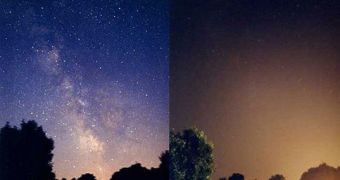The Australian National University is making an appeal to the inhabitants of all cities across Australia to turn off all lights this Saturday, between 8 p.m. and 9 p.m., in order to raise the awareness of the link between the energy consumption around the world and global warming effects. Amateur astronomers will have the opportunity to exploit the Earth Hour, as they have called it, to view the dark skies as light pollution should decrease during this time.
Light pollution is one of the biggest obstacles for space viewers in urban areas. "Light pollution is a real problem for optical astronomers, as it overpowers the light from distant stars and galaxies," says professor Brian Schmidt of the Research School of Astronomy and Astrophysics at the Australian National University.
Some of the lights in the cities are so bright that their inhabitants basically never see even some of the brightest stars on the night sky. Take Camber for example, which lost Mount Stromlo telescope because the amount of light emitted from the city was so great that observations could no longer be carried out, as Schmidt revealed.
Light pollution is also the reason why the SkyMapper telescope was located at Siding Spring campus, far from the bright lights of the cities. "When it comes online in a few months, SkyMapper will be among the first of a new breed of surveying telescopes that can scan the night skies more quickly and deeper than ever before. The remote location and lack of light pollution near Coonabarabran will help us collect very rich information," said Schmidt.
SkyMapper telescope will have the role to create a detailed digital map of the southern sky and to study distant objects in the universe, near our solar system and even the asteroids passing through the inners regions of the solar system. Collected data will be shared and studied in an international collaboration, through the Virtual Observatory initiative.
According to professor Schmidt, during the Earth Hour everyone could enjoy the night sky, even though advanced telescopes are not available for all of us. A simple pair of binoculars is all you need to start exploring the universe. Be careful, you might end up falling in love with astronomy by 9 o'clock p.m.!

 14 DAY TRIAL //
14 DAY TRIAL //